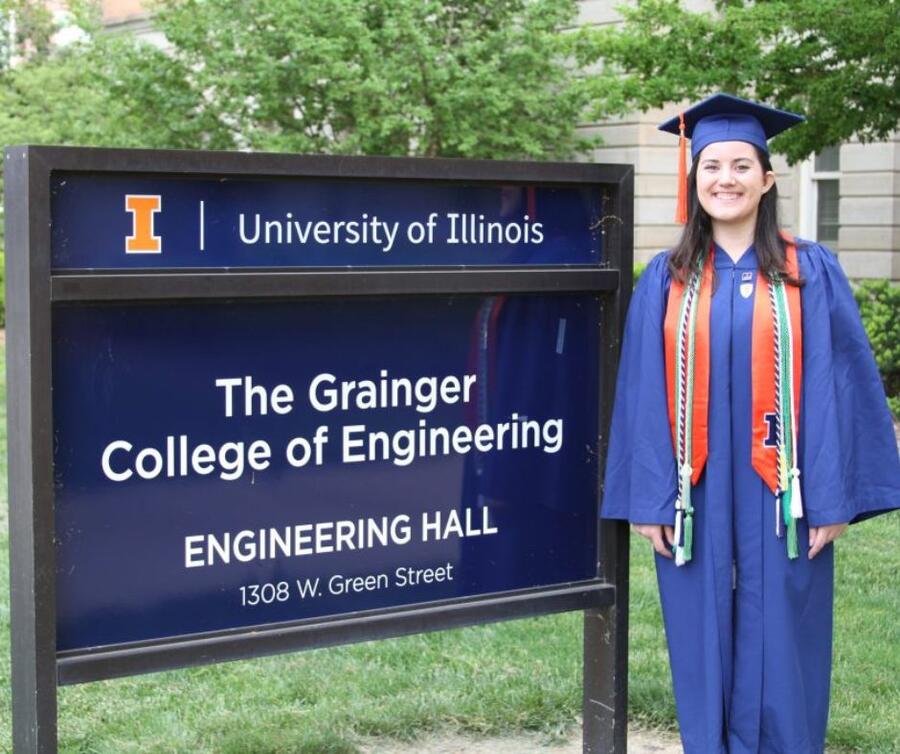I first learned about materials engineering on an eighth-grade science class trip to IBM. As soon as I got home, I told my parents that I was going to be a materials engineer. While they were fully supportive of my goal, they later confessed they had thought I might change my mind as I explored other areas of STEM. I did consider different iterations of what I wanted to do, but then I went to the Worldwide Youth in Science and Engineering (WYSE) Summer Camp at Illinois the summer before my junior year of high school, and it solidified my decision. I fell in love with the biomaterials curriculum and the tight-knit community that they have here, and so I came full circle back to Materials Science and Engineering (MatSE).
At Illinois I was an Engineering Learning Assistant (ELA) with the Grainger Engineering First-Year Experience (GFX) program for four years, where I taught ENG 100: Grainger Engineering Orientation Seminar, among other classes. Teaching ENG 100 was by far one of my most meaningful experiences because it was an opportunity for me to mentor younger students and share my own experiences, including the pitfalls I had run into and how to avoid them. I had the privilege of watching my students grow both as people and students on campus, and will get to see my first class graduate in May, which is unbelievable!
The GFX program, and more specifically the Assistant Director for the program, Gretchen Forman, made a huge difference in my college experience. I had a tough transition between my freshman and sophomore year and ended up taking a full year off to give myself a break and focus on my health. Gretchen was the person who reassured me that the opportunities would still be there when I got back, and that I could get involved in GFX again and keep teaching as an ELA once I returned. Having that support and belief in my abilities, as well as the opportunity to become heavily involved in a program like GFX, is one of the main reasons why I was able to graduate and accomplish the things I did.
I knew that I eventually wanted to go on to graduate school, but after taking time off and going through the pandemic, I just felt like I wasn’t ready to take on more school right away. I was accepted by the Peace Corps, but there was a gap before I could start the program. I spoke with Prof. Brendan Harley here at Illinois, who I worked with during undergrad for almost 4 years, and he offered to have me join on as a Research Scientist in his lab during that gap period. Although the Peace Corps ended up not working out, I now have a full-time job in Prof. Harley’s lab, and I couldn’t be happier. I found that in this role, I’m learning something new every day, whether that’s actual technical, hands-on skills that I’m working on with graduate students, or a paper that somebody has suggested I read. There’s also a lot of support from the other members of the lab, who are willing to show me the ropes, which I appreciate. While it’s not exactly what I thought I was going to be doing at this point in time, I’m incredibly happy with where I have ended up. Ultimately, I want to go to grad school, and am interested in doing an MD/PhD so that I can conduct patient-centric research, but I want to be open to getting involved in other opportunities too.
The biggest thing that I have learned from my time at Illinois is that very meaningful opportunities can come out of what might feel like failures. People can focus so much on what they think their definition of success is that they ignore other opportunities because of a lack of information or a belief that there is only one path toward your end goal. While failures or big changes in your plans don’t feel great in the moment, those are sometimes the experiences that are most meaningful, and I encourage everyone to go into those failures with open minds and see what other possibilities are out there.
